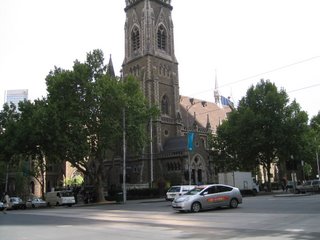
I have recently returned from Melbourne where during my travels I revisited some key sites connected with the ministry of F W Boreham. One of these is Scots’ Church on the corner of Russell and Collins Street. Let me quote from a chapter I wrote elsewhere about the emergence of Boreham’s significant ministry at Scots’ Church:
“At his farewell address to Spurgeon’s College Boreham said, “I should like to go out to the ends of the earth, to hold three pastorates, and then to be in a position to preach, as I might be led, in all lands and among all denominations”.[1] His dream was fulfilled accurately when after twelve years at Armadale Boreham retired in 1928, at the age of fifty-seven, to undertake an itinerant ministry across many denominations and in different parts of the world. Fulfilling a lifelong dream that had probably been fired through his contact with Hudson Taylor and “Dr Meyer, the ubiquitous”, Boreham toured Great Britain and North America in 1928 and 1936 preaching in distinguished pulpits and visiting many sites that related to people about whom he had written.[2] When in Melbourne he regularly served as a guest preacher in city and suburban churches. By 1945, the Age reported that “Dr Boreham has preached for almost every Protestant denomination here and overseas, helping to emphasize the fundamental unity of the churches”.[3] His one long-standing commitment was his weekly sermon at the Wednesday lunch hour service at Scots’ Presbyterian Church in Melbourne, a task that he commenced in 1936 for a month but “was impelled to carry on for the next eighteen years”.[4] With Boreham’s fame and international reputation these services were judged to be “one of the most effective religious influences in the city”.[5] The services attracted large congregations which frequently included many tourists from overseas and interstate who had learned of the preacher through his books. Boreham’s sermons were reported in the columns of the Age and the Argus and such was his drawing power that the Collins Street Independent Church dismissed the idea of scheduling their own mid-week service, claiming that the Scots’ mid-week service was for the entire city of Melbourne and that Boreham “belongs to every denomination”.[6]
When I moved to Melbourne I encountered so many people who regularly spent their lunch hour at Scots’ Church being nourished by the brief period of worship and the sermon by Dr Boreham. I also met many people who could remember stories that Boreham told and sermon themes he delivered from the Scots’ pulpit sixty years earlier!
Boreham saw himself as a shuttle weaving different denominational threads together to create something of unity and beauty. Some Baptist pastors were peeved that Boreham was not as available to speak in their pulpits because he was in churches of other denominations. They also were irritated by Boreham’s preaching fee that was too steep for many of the Baptist churches but within the capacity of churches of other denominations. They thought Boreham was rather mercenary in this request but little did they know that his preaching fees (and royalties from his books) went to fund the John Broadbanks’ Dispensary in Birisiri, East Pakistan (now Bangladesh) which is still operating today.
Of great significance is that F W Boreham preached at the Scots’ Church throughout the years of the Second World War. Whatever did Boreham say to the people who flocked to that packed church every week in those difficult and dark days? You would be surprised! I wish someone would research this further and write about Boreham’s preaching ministry at Scots’ Church. There is a thesis waiting to be written on this topic. Anyone interested?
Geoff Pound
geoffpound@yahoo.com.au
For more information about Scots’ Church see:
http://www.scotschurch.com/
Image: Scots’ Church, taken during the recent Commonwealth Games, March, 2006.
[1] Age, 26 March 1955.
[2] Fullerton, F B Meyer: A biography, 196. This description was given by Dr John Clifford, a prominent English Baptist minister of the day.
[3] Age, 15 March 1945.
[4] New life, 17 July 1986.
[5] Scots’ Church Leaflet, February 1946.
[6] Scots’ Church Leaflet, November 1947.


